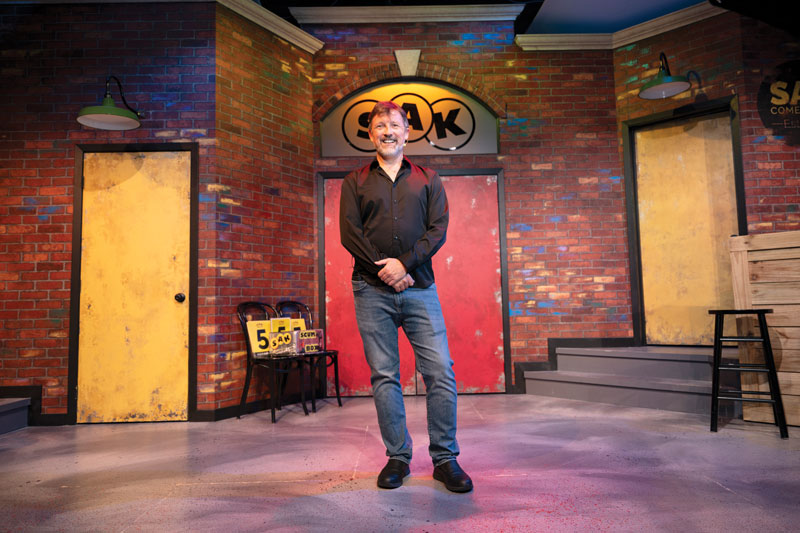
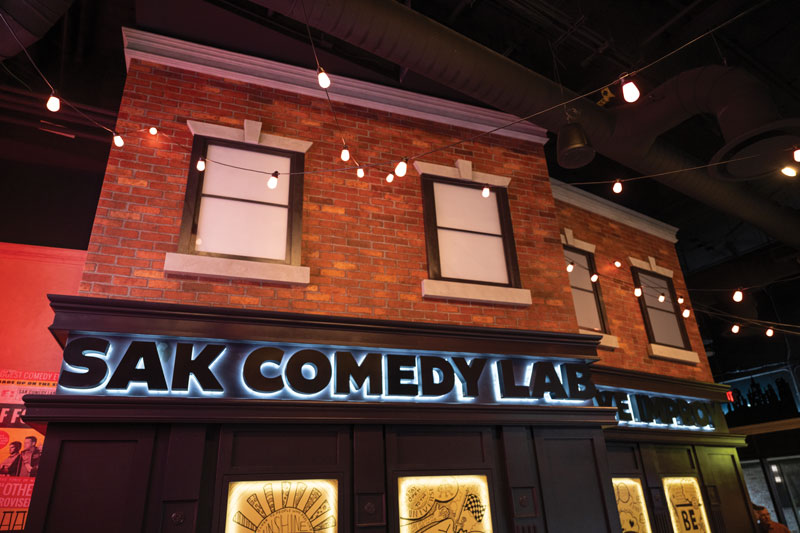
David Charles, a professor in the Department of Theater & Dance at Rollins College, would never suggest that he wrote the book on improvisation. But if he chose to, he could lay a legitimate claim to being the harrowing (and, when it works, hilarious) theatrical genre’s own Noah Webster.
With publication of The Improv Dictionary: An A to Z of Improvisational Terms, Techniques, and Tools (Routledge, 2024), the New Zealand-born Charles has managed to not only synthesize but alphabetize his vast knowledge of improv.
That’s the increasingly popular yet still misunderstood school of theatrical presentation in which everything from the plot to the characters to the dialogue is made up on the spot, often using host or audience prompts. Yes, like the TV show Whose Line Is It Anyway?, which features Orlando’s own Wayne Brady.
(Charles loves the show because it has helped to make improv mainstream. However, he adds, the half-hour laughfest only hints at improv’s potential as a force for social change.)
The Improv Dictionary is a direct outgrowth of Charles’s work at the college. There he has spent 21 years leveraging his three academic degrees in theater and related disciplines by teaching students how to be spontaneous on stage.
For the last 20 of those years, Charles has also overseen a group of student performers, the Rollins Improv Players, who stage about 30 shows per year. Meanwhile, the man known as “Dr. D” on campus is recognized in the broader community as a veteran ensemble player at Orlando’s flagship improv theater, SAK Comedy Lab—where a 16-year-old Brady honed his comedic chops in the late 1980s.
In The Improv Dictionary, Charles shares what he has learned in a unique way: He has arranged the art form’s tactics and philosophies into a dictionary format, explaining such terms as “bulldozing” (strong-arming your partners into going along with your vision for a scene, a practice that is frowned upon) in succinct, easily navigable chunks.
What’s more, Charles has tried to nudge the conversation on improv forward by pursuing a more modern, culturally inclusive approach that he feels is wholly in keeping with the collaborative nature of the genre itself.
“I very much wrote the book that I’d been looking for as a teacher,” he says. “One of the challenges I’ve had is finding books that are—I don’t even know how to phrase this—as theoretically insightful as they are artistically insightful.”
The result is an oversized, 300-plus-page tome that may be as useful to seasoned improv performers looking for new problem-solving strategies as it is to newbies who need the entire process demystified a bit. “Improv’s a weird beast,” notes Charles. “When it looks good, boy does it look easy.”
And Dr. D. should know: He has been doing his best to make performing look easy since his teens.
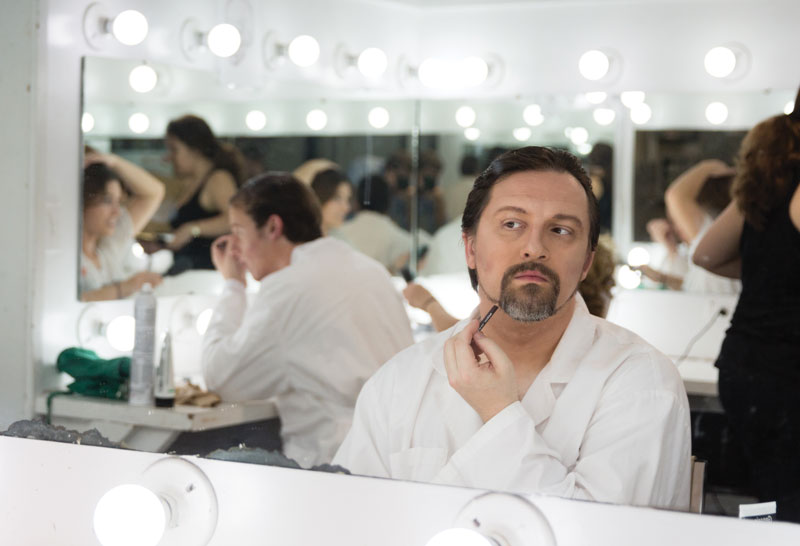
THE STRIPY SOCKS
As a high schooler in his native New Zealand, Charles caught the theater bug early and cultivated a parallel passion for both the structure of scripted fare and the spontaneity of improv—the latter of which is the very definition of working without a proverbial net.
Improv, he recalls, experienced a huge surge in popularity back home thanks to the adoption by schools of Theatresports, a franchise originally developed by a theater educator in Canada and inspired by the “heat” generated by trash-talkers in the world of professional wrestling.
An investment firm, the United Building Society of New Zealand, funded the program, in which teams of high-school improvisers would vie for points in local, regional and national competitions that presumably resulted in more belly laughs than bloodletting.
Charles—who describes his teenaged self as having been “painfully shy”
—and a ragtag troupe dubbed “Stripy Socks” (because that’s what they wore) from Logan High School in Dunedin soon became committed improvisers and even placed third in the country’s first high-school national finals.
“Suddenly,” he recalls, “I was in a space where all those weird things I liked to do, like make up original songs while walking to school, had a name and a value. Needless to say, I was hooked.”
The turning point for Charles came when his drama teacher—her name was Denise Walsh, a woman whom he still reveres—enrolled him and some of his classmates in a high-school thespian competition at Ball State University in Muncie, Indiana. Charles recalls the trip as a pricey prospect for someone who came from a family of humble means.
But when he was able to scrape together enough kiwis (a casual term for both New Zealand dollars and New Zealanders) to get to Muncie, seeing the quality of performances from American high schoolers inspired him to audition for—and earn—a scholarship to Roosevelt University in Chicago, where he earned a bachelor’s degree in theater and English.
Charles also immersed himself in the thriving improv scene that still flourishes in the Windy City, joining Chicago ComedySportz and the Players Workshop of Second City. He then “followed the Mississippi River” to pursue an MFA in performance at Western Illinois University.
After that it was on to Baton Rouge, where he earned a Ph.D. in theater history, criticism and dramatic literature at Louisiana State University. Although as a student he had always performed with local improv companies, during his first year at LSU he decided to eschew gigs and concentrate solely on his studies—making himself utterly miserable in the process.
During his second year, he formed his own troupe called “The Improvisors.” And yes, he does chuckle when he reflects on the distinct lack of creativity in that name. (But, in his defense, who had time to ponder clever monikers while simultaneously writing a dissertation on global improv history, trends and practices?)
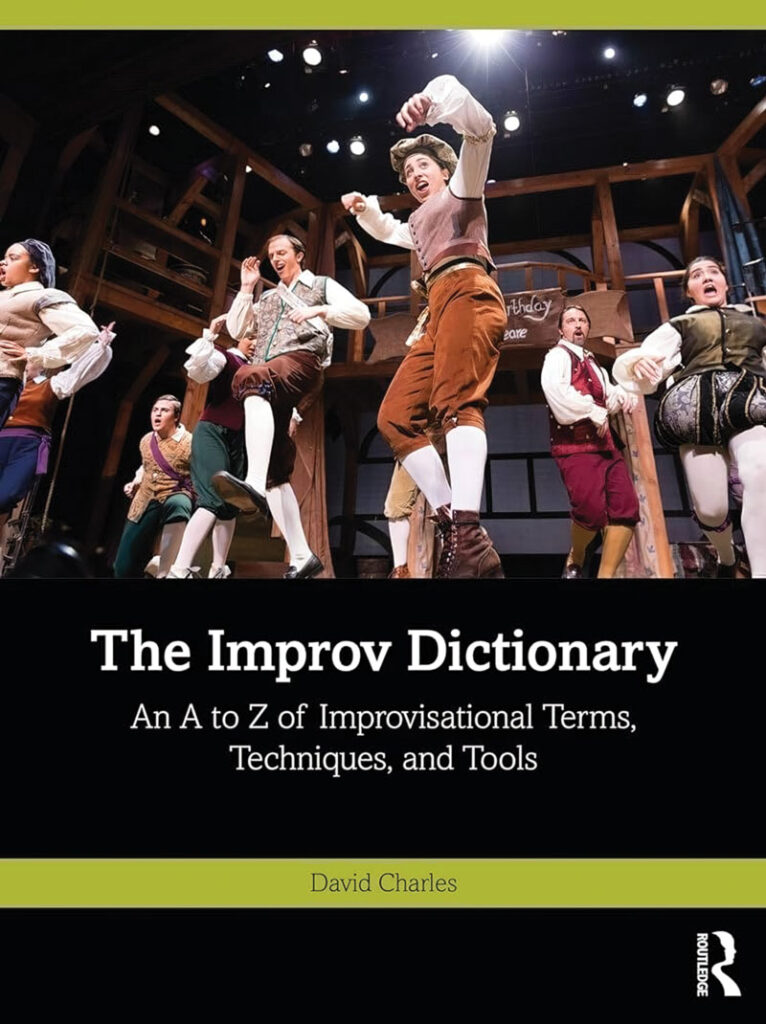
PROFESSOR OF LAUGHS
Charles’s first job upon receiving his doctorate was at Rollins, where since his arrival in 2003 he has served as department chair, producing director of the Annie Russell Theatre and founding director of the Rollins Improv Players. In addition, he has earned the designation of Cornell Distinguished Faculty Member.
In 2020, a planned sabbatical from his customarily busy college schedule was thrown into disarray and the projects he had planned to tackle were knocked off kilter by the initial outbreak of COVID-19. To keep his creative juices flowing, he began an improv-related blog on improvdr.com, his website, where he included a related game or exercise with each post.
The blogging medium, Charles says, appealed to his sense of structure and organization, and the format essentially presented itself: “I just started working through the alphabet.” While he was in the thick of the project, Routledge—a U.K.-based academic publisher—approached him about repurposing the material into a book.
Charles was enticed by the prospect of adding to a canon that already included highly regarded reference works by acting coach Viola Spolin, a pioneer of theater games; actor Del Close and comedian Charna Halpern, co-creators of long-form improvisational theater; and educator and director Keith Johnstone, mastermind of the aforementioned Theatresports.
Heady company, to be sure. Even so, Charles believed that he had plenty to add to the challenging ongoing conversations within the arts world about inclusion, representation, hierarchies, paternalism and misogyny.
“A lot of the improv books that I really like, and a lot of the practitioners I really like—not all of them—are problematic. And I say all of that while acknowledging the extraordinary wealth of the writers that I lean on.”
In its finished form, The Improv Dictionary is epic but user friendly. The format allows readers to absorb its wisdom in short bursts, and in any order. The hardest entry to write, Charles admits, was the one that defines “improvisation” itself—a five-point summation that had to be both concrete and flexible enough to suit a genre that thrives on constant change and evolution.
The writing is as scholarly as you’d expect from a professor but with a recurring strain of self-effacement that helps to maintain an appropriately encouraging tone. The message “anyone can do it, including you” all but leaps off the pages. You’ll not only have fun, Charles promises, but you’ll likely also bolster your emotional wellbeing.
“You see students craving those connections, craving a place to be seen and heard,” says Charles, who, as a divorced dad with a child of his own knows something about the emotional needs of the young. “I say to many people [that] it’s not so much I teach theater; I teach empathy.”
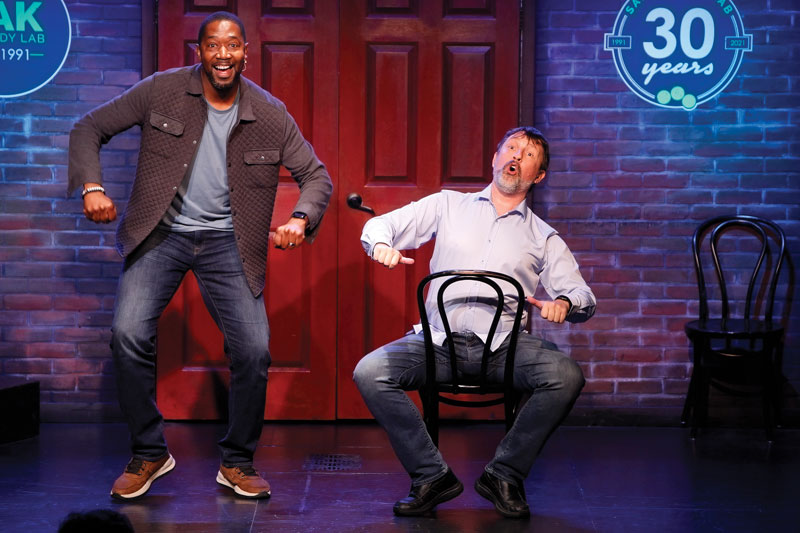
MIRTHFUL MENTOR
Dr. D’s pupils and colleagues aren’t caught flat-footed or tongue-tied when they’re given his name as a prompt. “David Charles was probably the single most important mentor figure I had as a student at Rollins College,” says Gray Lefkowitz, a 2024 graduate who was an active member of the Rollins Improv Players.
Adds Lefkowitz: “He opened my eyes to being spontaneous, loose and honest in performance and in life. However, his wisdom as a teacher goes beyond theater. He’s someone whose self-awareness as a human being makes it very easy to come to him for life advice.”
Charles enjoys a similar exalted stature at SAK, where he started performing in 2004, just a year after his arrival at Rollins. He has been a fixture there ever since, save for one 18-month stretch during which he appeared at the (sadly) now-defunct Comedy Warehouse at Disney’s Pleasure Island.
His presence exudes a kind of authority-without-pedantry that’s praised by colleagues and obvious to audiences—and not just because of his rich accent and dialect, which he admits that he has actively tried to maintain.
As Charles writes in The Improv Dictionary, being a good improviser hinges on maintaining a wealth of diversified knowledge from which you can draw at a moment’s notice. Charles lends just that to shows at SAK, injecting well-informed wit into such perennial favorites as the competition-style “Duel of Fools.”
“David Charles is a wildly talented performer and improv creator,” says Chris Dinger, executive director of SAK. “This guy is not settled in life unless he’s building something creatively new, usually on the improv stage. He pushes us to always have an ambitious idea in our back pocket, so we don’t get locked in one creative direction,”
For example, Charles was the creative force behind Lights Up!, a long-form piece that features a cast of actors and musicians who, using spectator suggestions, create and perform an entire rock opera—one with a discernable storyline—on the fly.
Another “SAKtor,” Chelsea Hilend, is in a unique position to evaluate Charles’s skills as both a mentor and a performer: Not only has she acted alongside him for the past 13 years, but she’s also associate director of theater, communications and operations at her alma mater, Rollins.
Says Hilend: “I’ve watched David make an incredible impact on generations of students, players and patrons.” She describes the classroom environment that he creates as “at once warm and rigorous. His feedback is both nuanced and incisive. Inside every lesson and every project, he sets a clear vision while welcoming collaborating voices.”
And in the green room at SAK, she adds, Charles—ever the comedic
academician—is an insightful analyst of what’s funny and, more importantly, why it’s funny. At the same time, he consistently advocates for taking risks, pursuing excellence and offering thoughtful storytelling.
“That’s one of the agendas of the book,” says Charles. “In order for others to take improv seriously, we as practitioners need to take it seriously.” That means expanding the public’s understanding of the form beyond the short sketches they get from such programs as Whose Line Is It Anyway?
Charles certainly flies that flag at SAK, where—not surprisingly—the paying customers are more interested in having a good laugh than in having their collective consciousness raised. Those goals, however, are not mutually exclusive—a contention that Charles thoroughly explored in his Ph.D. dissertation.
Improv, he wrote, through its “constant exploration of novelty and newness, its innate and tireless tendency to depart from dominating structures” can be an impetus for change and offers “a hopeful approach for seeing and shaping human experience and interaction.”
These days, thanks in part to acclaim for his book and thanks in part to his growing reputation as improv’s resident explainer and philosopher, Charles has become something of an ambassador for the genre as well as a performer and a teacher.
Earlier this year, he traveled to Carnegie Mellon University in Pittsburgh for the 2024 Detour improv festival, followed by a May residency with Impro Theatre ACT in Canberra, Australia, and a homecoming appearance at the Covert Theatre in Auckland, New Zealand.
Charles’s greatest thrill is knowing that he is—to borrow an American sports analogy—moving down the field. “In some ways, I think that’s what my academic and my professional lives have been,” he says. “Trying to show others and myself ‘So you think that is improv? How about this?’ I just keep pushing what it can do, what it can be and what it can feel like.”
In other words, Dr. D. is, as he always has been, simply making it up as he goes along.
